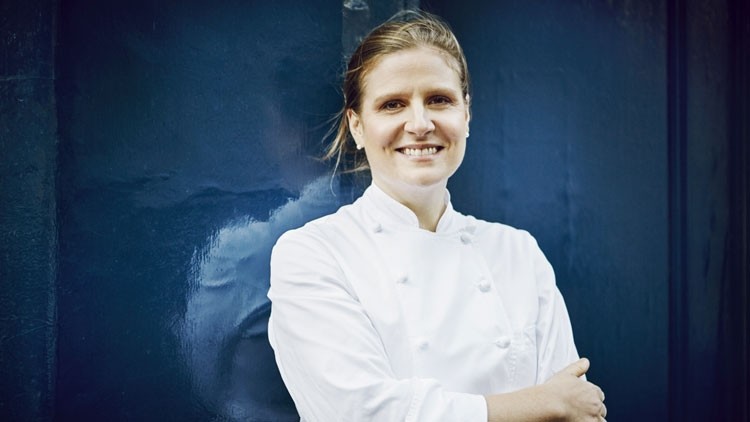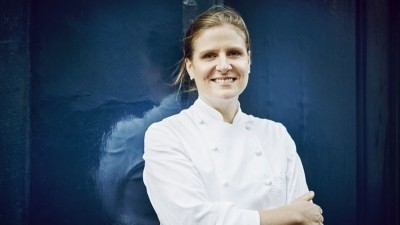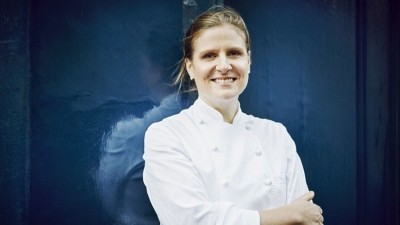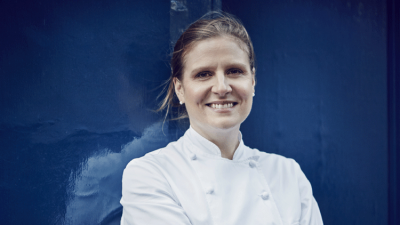Chantelle Nicholson: "If parents watch Hell's Kitchen, would they want their child to be in that environment?"

Tredwells opened four years ago and you're now an owner, does this mark a change for the restaurant?
It’s a big move for me but I’ve always treated it as my own restaurant. There’s still 15 years left on the lease so it’s a long-term thing. It gives me a grounding as well. I’m still just as involved in the rest of the group, with Marcus and The Gilbert Scott, both of which I’ve worked at. I wouldn’t want to not be part of those places.
How has the restaurant changed since its inception?
The whole reason we opened Tredwells in the first place was that I wanted a place that served familiar food with friendly service and an easy-going wine list. The menu from day one has been very inclusive – if someone is lactose intolerant, for example, we didn’t want them to feel like they couldn’t eat anything, which is why we labelled all the allergens on the dishes and created ones suitable for lots of people. We opened when there was all the hoo-ha around allergen labelling and the menu has continued with this ever since.
We are about to launch a tasting menu using whole animals, so one day it might feature bavette, the next day braised featherblade. From a guest perspective it is interesting and also from a kitchen one as it makes us think a bit more and keeps things dynamic. We won’t just be using prime cuts.
You've also recently introduced a children's tasting menu
It’s seven courses but the dishes don’t all come out one after another – there’s three starters on a board and then a main and a side and then two little puddings. I feel children do understand food and where it comes from. If someone who is not a child’s parents or somebody they see all the time puts something in front of them they are a lot more receptive to trying it. We take them downstairs to make their own soft-serve ice cream and they have to walk through the kitchen to do it, which is immersing them in something they may not have experienced before. And we try to get them to try something they say they don’t like.
Such as?
I went back to my childhood to think about what I didn’t like and why. I hated spinach, so we use it in our cheese croquettes – it’s cheesy and delicious but has lots of spinach in it. Maybe they’ll go on to try spinach cannelloni after eating that. We also do char-grilled broccoli with almond butter, so it’s richer than steamed vegetables, and we serve new potatoes with parmesan aioli – there’s the familiarity of a new potato but a little bit of something different.
How has it gone down?
It’s not for everyone, it depends on the kids, but seven to 12-year-olds really like it. Some children have been so excited about going into the kitchen. And it’s £17, so some parents won’t want to spend that amount of money on their children [they can order from the standard children’s menu]. We have even had adults asking for it for themselves.
You published plant-based cookbook Planted earlier this year - did you expect vegan food to take off in such a way as it has?
It happened a bit organically really, without me foreseeing this huge craze that has happened this year. We launched a plant-based tasting menu in November last year [called Vegwells] and when I tried to find recipe books and resources for cheffy techniques for cooking plant-based dishes, I couldn’t find a huge amount. I thought if I could create something that can be used by chefs, at least that’s helpful. It’s being published in America this month.
What are the other trends in the industry at the moment?
We are in the shit as an industry in terms of staff and skill shortages. If you look at how many kids are coming into the industry it is minimal. Why is that? I judged the Future Chef competition for 12 to 16-year-olds and there were 14,000 entries – there are that many kids that young interested in cooking so where is this drop off happening? Is it at schools? Is it the parents? If all your experience of our industry is from Gordon Ramsay’s Boiling Point and Hell’s Kitchen would you want your child to be in that environment?
What can be done to change this?
Hospitality is just not talked about as a viable career path and this needs to change. There’s nothing we can do with the generation right now but we can get into the schools and colleges and talk to kids face to face about what we do on a daily basis. As a restaurant, we do lunch and dinner, and every service we can see all the effort we’ve put in, you often don’t get that in a desk job. It’s such a sense of reward that isn’t talked about. I spoke to a young girl who said that the restaurant industry was antisocial and chefs worked unsociable hours.
Some of my guys in the kitchen can work a three-and-a-half day week and then get three-and-a-half days off. Is that antisocial and unsociable hours? If we don’t start to unpeel the problem and look at the core and work outwards, things are going to get very tricky.
This article that first appeared in the October issue of Restaurant magazine, the leading title for the UK's restaurant industry. For more features, comment, interviews and in-depth analysis of the restaurant sector subscribe to Restaurant magazine here.














